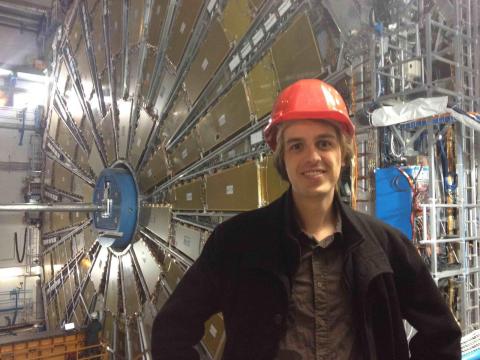
TRIUMF graduate student Simon Viel is the recipient of one of the most prestigious fellowships in particle physics, the Chamberlain Fellowship at Lawrence Berkeley National Laboratory. Simon, who is currently completing his Ph.D. at UBC and TRIUMF, has been a member of the ATLAS experiment since 2009, working on two major data analysis projects. As Chamberlain Fellow at Berkeley, Simon will continue to work on the ATLAS experiment, but his focus will shift to research and development as he joins the team responsible for the replacement of the inner detector of ATLAS. This replacement will be necessary for operating ATLAS following the high-luminosity upgrade to the Large Hadron Collider, scheduled for 2023.
Simon's passion for experimental particle physics stems from the fact that "exciting experiments answering the most fundamental questions are happening right now." Nowhere is this more evident than with the LHC experiments, which achieved a breakthrough in 2012 with the discovery of a Higgs boson. This result has opened new avenues for researchers as they explore possible extensions to the Standard Model of particle physics. Finding deviations from the Standard Model is very important because it may reveal explanations for some of the Standard Model's theoretical problems and notable omissions, such as dark matter and neutrino masses.
This has been the driving motivation behind Simon's work at TRIUMF. He received a Vanier Canada Graduate Scholarship in 2011 for a data analysis examining the invariant mass distribution of dimuon events recorded at the ATLAS experiment. A new peak in the mass spectrum would indicate a new particle, corresponding to a new force of nature. While this analysis did not result in the discovery of such a new particle, it considerably improved the limits on the production rates of hypothetical ones, informing theorists as they build new theories that reach beyond the Standard Model.
Simon's current work with ATLAS focuses more directly on the Higgs, examining vector-boson fusion, one of the sub-leading production channels for the newly discovered particle. This occurs when two W bosons, the carriers of the weak nuclear force, fuse to create a Higgs boson. The Higgs then rapidly decays, often into two W particles again. By measuring the rate of that process, physicists will be able to develop a better understanding of the Higgs boson's coupling to the W boson.
At TRIUMF, Simon has developed extensive experience in the analysis of large data sets, benefitting from contact with local experts in the field as well as the top-notch computing facilities offered here. "This experience gave me an edge compared to other Ph.D. students," he explains."TRIUMF has really helped me achieve my goals as a doctoral student." Simon is supervised by Dr. Oliver Stelzer-Chilton at TRIUMF and Dr. Colin Gay at UBC.
Before receiving the fellowship, Simon underwent a rigorous application process that required him and other shortlisted applicants to travel to LBNL, meet the scientists in their prospective departments, and give a presentation to the Physics Division. In September, he will begin his three-year term at Berkeley, with the possibility of a two-year extension. Once the design for the new ATLAS inner detector is completed, he plans to return to Higgs analysis, this time examining di-Higgs production.
"Simon has been a top student and has had a really strong research impact with the ATLAS experiment over a wide array of topics and projects," explains Oliver Stelzer-Chilton. "I am sure he will continue to do fantastic work while at LBNL."
Congratulations, Simon, on this momentous achievement!
-Lindsay Kroes, Communications Assistant
